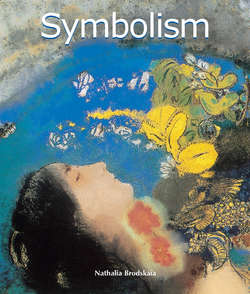Читать книгу Symbolism - Nathalia Brodskaya - Страница 4
На сайте Литреса книга снята с продажи.
Introduction: The Manifesto of Symbolism by Jean Moréas
First Scene
ОглавлениеFrantisek Kupka, The Principle of Life, 1900–1903.
Coloured aquatint, 34 × 34 cm.
New York Public Library, New York.
THE DETRACTOR. – Oh! These Decadents! What pomposity! What gibberish! As our great Molière was correct when he said:
This figurative Style of which people are so vain,
Is beside all good taste and truth
THEODORE DE BANVILLE. – Our great Molière committed here two evils towards those who themselves partake as much as possible of good taste. What good character? What truth? The obvious mess, vivid craziness, passionate pomposity is the very truth of lyric poetry. To fall into excess of imagery and colour is not a great evil, and it is not by this that our literature will perish. In the worst of times, when it dies decisively (as, for example, under the First Empire), it is not pomposity and the abuse of ornamentation that kill it, it is dullness. Taste and naturalness are beautiful things undoubtedly less useful than one thinks poetry to be. Shakespeare’s Romeo and Juliet was written from beginning to end in a style as affected as that of the Marquis de Mascarille; that of Ducis shines by the happiest and most natural simplicity.
Giuseppe Pellizza da Volpedo, The Rising Sun or The Sun, 1903–1904.
Oil on canvas, 150 × 150 cm.
Galleria Nazional d’Arte Moderna, Rome.
THE DETRACTOR. – But the caesura, the caesura! They’re desecrating the caesura!!
THEODORE DE BANVILLE. – In his remarkable prosody published in 1844, Mr Wilhem Tenint establishes that the Alexandrine verse admits twelve different combinations on the basis of the verse which has its caesura after the eleventh syllable. He returns to say that, actually, the caesura can be placed after any syllable of the Alexandrine verse. In the same way, he establishes that verses of six, seven, eight, nine, ten syllables admit variable and variously placed caesuras. Let’s do more: let’s dare to proclaim complete freedom and say that in these complex questions the ear alone decides. One always perishes not from having been too bold but from not being bold enough.
THE DETRACTOR. – Horror! Not to respect the alternation of rhymes! You know yourself, Sir, that the Decadents dare to even allow hiatus! Hiatus even!!
THEODORE DE BANVILLE. – Hiatus, the diphthong making a syllable in verse, all other things that were forbidden and especially the optional use of masculine and feminine rhymes have provided to the poet of genius one thousand means of delicate effects, always varied, unexpected, inexhaustible. But to use this scholarly verse, genius and a musical ear were necessary, while with stationary rules the most mediocre writers can – while obeying them faithfully – make, alas! tolerable verses! Who therefore gained anything from the regulation of poetry? Poor poets. Only them!
Giovanni Segantini, The Bad Mothers, 1894.
Oil on canvas, 105 × 200 cm.
Österreichische Galerie Belvedere, Vienna.
Léon Spilliaert, The Crossing, 1913.
Pastel and coloured pencils, 90 × 70 cm.
Private collection.
THE DETRACTOR. – It seems to me, however, that the Romantic revolution…
THEODORE DE BANVILLE. – Romanticism was an incomplete revolution. What a pity that Victor Hugo, this victorious, bloody-handed Hercules, was not completely a revolutionary and that he let live a group of monsters which he was put in charge of exterminating with his flaming arrows!
THE DETRACTOR. – All innovation is madness! The imitation of Victor Hugo is the salvation of French poetry!
THEODORE DE BANVILLE. – When Hugo had liberated verse, one was to believe that, educated by his example, the poets coming after him would want to be free and only to raise themselves up. But inside us is such a love of constraint that the new poets, as if in competition, copied and imitated the most typical of Hugo’s forms, combinations and cuts, instead of endeavouring to discover new ones. This is how, fashioned by the yoke, we fall again from one slavery to another, and that after the Classical conventions, there were the Romantic conventions, conventions of cuts, conventions of sentences, conventions of rhymes; and convention (that is to say, the cliché become chronic) in poetry, as in anything else, is Death. On the contrary, let’s dare to live! and to live is to breathe the air of the sky and not the breath of our neighbour, though this neighbour be a god!
